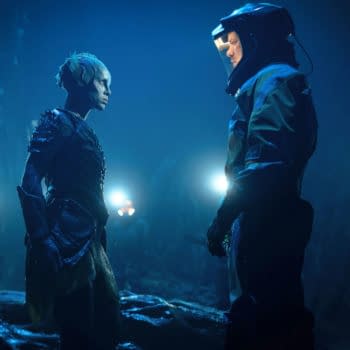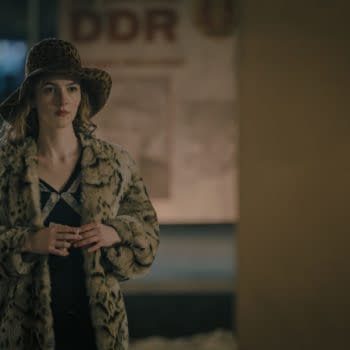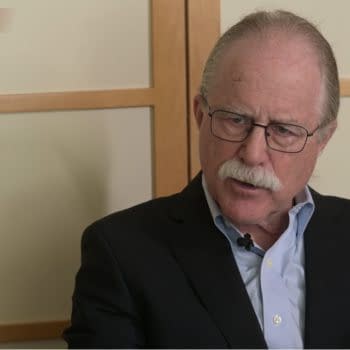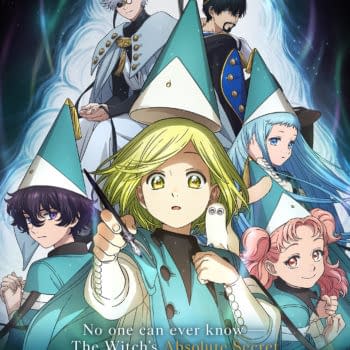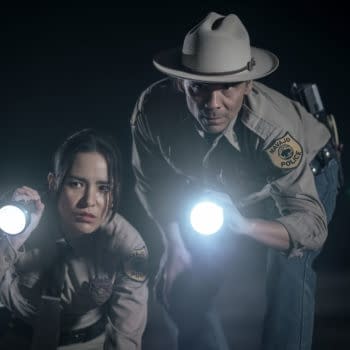Posted in: BBC, Disney+, Doctor Who, TV | Tagged: bbc, christopher eccleston, disney, doctor who, john barrowman, peter capaldi, steven moffat
Doctor Who: "Boom" Reveals More of Steven Moffat's Hidden Continuity
In "Boom," Steven Moffat reveals more of the slightly hidden lore of the 51st-century history he created in Doctor Who beginning in 2005.
Article Summary
- Steven Moffat's "Boom" offers deeper insight into Doctor Who's 51st-century lore.
- Continuity gems include the SS Madame de Pompadour and Captain Jack's origins.
- Villengard stands as one of the greatest foes within Moffat's crafted universe.
- The Church of England's militarization and River Song's imprisonment are explored.
When Steven Moffat writes for Doctor Who, he often goes for bangers, especially his one-off episodes. "Boom" is the latest one that everyone will be talking about again. Moffat is as much of a continuity geek as Russell T. Davies and has not-so-secretly created a whole continuity within the series that he draws on ever since Davies revived the series in 2005.
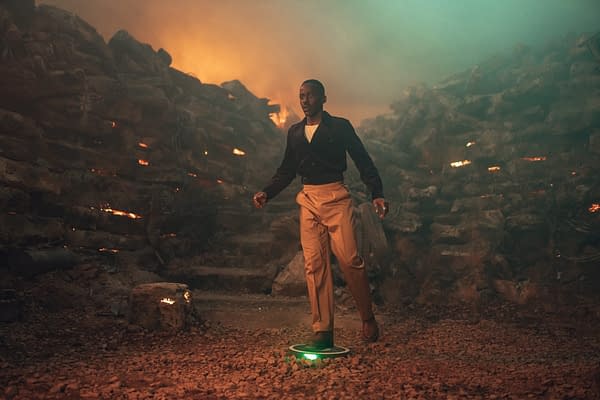
The 51st Century in Doctor Who is Steven Moffat's Playbox
Moffat's continuity stems from the 51st Century. Entire TV series, characters, organisations, and spinoff series could be pulled from Moffat's continuity. In Series Two's "The Girl in the Fireplace," the abandoned spaceship with its literal-minded computer is from that time period. The twist that the Doctor doesn't know – but we do – is that the ship is called the SS Madame de Pompadour, which is why it targeted the real Madame de Pompadour (Sophia Myles) in the 18th Century, thinking it could repair itself by taking her brain.
Moffat's 51st Century is one of the only instances where a specific time period has a unified continuity and lore in Doctor Who. Below is a list of recurring elements in the series that are from the 51st Century.
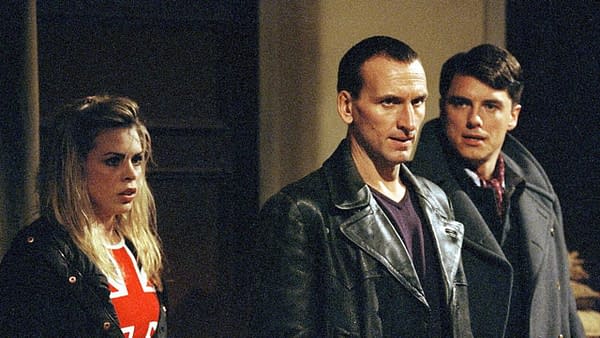
Captain Jack and the Time Agents
This is where Captain Jack Harkness (John Barrowman) is from and the organization of time agents he was a member of before taking off to be a time-traveling con man. Humanity in the 51st Century has discovered time travel and developed technology for it, of which The Doctor disapproves. That's why The Doctor disabled Captain Jack's wrist device to keep him stuck in the 21st Century at the end of Series Three. Moffat never made clear what the time agents did and whether they were good or bad guys. Another time agent and former lover of Captain Jack's, Captain John Hart, showed up in season two of Torchwood, played by Buffy's James Marsters.

Villengard, One of The Biggest Villains in Doctor Who
Villengard is a planet whose entire business is to be the biggest arms manufacturer in the known universe, which immediately makes them the bad guys in any Doctor Who story. Their name is a play on "villain" and "guard", which says it all. They were first mentioned in Series One, in Moffat's first 2-parter, "The Empty Child" and "The Doctor Dances", which introduced Captain Jack. The Doctor (Christopher Eccleston) mentions he'd visited the Villengard Corporation before and destroyed them once and for all. They made sonic blasters, which are weapons Captain Jack mentioned, and that's probably the least terrible thing they manufactured. Villengard was mentioned in one of the Eleventh Doctor video games when Moffat was showrunner, and in the Big Finish audio dramas about The Time War, the War Doctor fought to destroy key Villengard weapons factories before the Daleks could seize control of them but let's stick to what's been in the TV series.
Villengard is perhaps the biggest villain of the 51st Century in Doctor Who. In Moffat's final story as showrunner, "Twice Upon a Time," the Twelfth Doctor (Peter Capaldi) visits the ruins of Villengard to visit Rusty, the (sort of) reformed Dalek, who has taken over Villengard and uses it as a trap and hunting ground to kill any Daleks that come hunting for Rusty.

A Militarised Church of England
In Moffat's scripts, the Church of England has become a military force. This feels like a combination of satirical commentary because he could have just made them a generic military without the religious pinning. If you're not British and you weren't aware, The Church of England is possibly the most progressive and tolerant wing of Christianity in the world. They allow their vicars to marry and have children, including LGBTQ vicars and members. Nobody in the UK bats an eyelash about the Church of England. Under Moffat's eye, they're trigger-happy jerks like just about all the soldiers throughout the history of Doctor Who, driven by fear and blind obedience to orders.
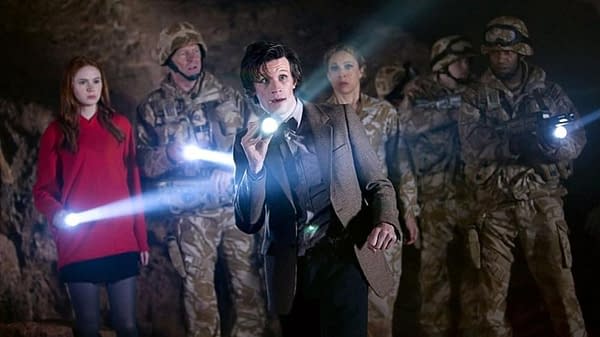
The Anglican Marines first appeared in Series 5 in Moffat's two-parter "The Time of the Angels" and "Flesh and Stone," where they work with River Song (Alex Kingston) to capture a Weeping Angel on a colony planet as part of her parole agreement. They were largely sympathetic in this story, just doing their jobs and trying to defend the colony. In "Boom," they're trigger-happy jerks, true believers in religious doctrine blinded by their faith from questioning the war they're fighting. It's not spelled out, but The Anglican Church Military seems to be in deep with Villengard. Villengard sells them their weapons and handles their medical care. The Villengard ambulances only treating believers is surely a deal the Church made, and it's a sign of their tribalism and exclusionism, and the current Church of England isn't that exclusionary.
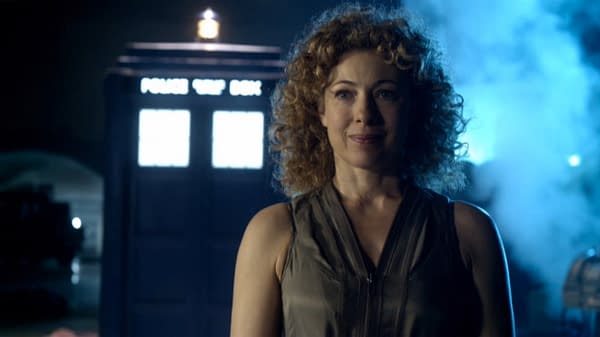
River Song is Imprisoned at The Stormcage in the 51st Century
River Song is incarcerated for murdering The Doctor in Season Six of the new series when Moffat was showrunner. This was a plan they agreed upon so that the universe could forget him and his enemies could stop targeting his friends. The penitentiary she's jailed in is the Stormcage, which is in the 51st Century. It's really a convenient place for her to park herself and take a break between easily escaping to have more escapades in the TARDIS, whether with or without The Doctor. Eventually, she would qualify for her doctorate in Archeology and, it seems, be set free to be a professor teaching college students and raiding tombs across time, which is when she shows up in "Silence in the Library" in Season Four, which is her first appearance in the series, also written by Moffat.
And with that, we've come full circle with Moffat's 51st Century.
Doctor Who is now streaming on Disney+.





